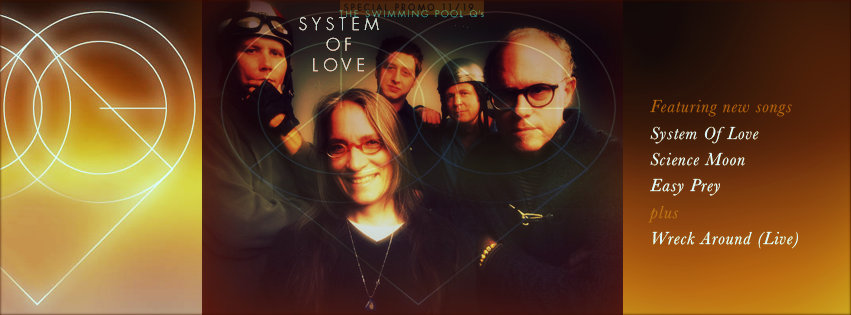System of Love EP by The Swimming Pool Q's- MP3 Album
Deep End Press > The State (2) > The State
The State
Columbia, South Carolina
Friday, May 25, 2001
Pool Q's rode new wave of music into Midlands
by MIKE MILLER
What a difference a couple of decades can make.
When The Swimming Pool Q's first came to Columbia in March of 1979, they found an audience starving for something out of the ordinary. Nowadays, a regional band is lucky to find an audience here at all.
The Atlanta band had made their maiden voyage to New York to play clubs such as Max's Kansas City and CBGB's that year, and on their way home they stopped by for a two-night stint in the Golden Spur in USC's Russell House student center.
"As I recall, the student radio station (which is also in the Russell House) was little more than a couple of booths, and they let us take over the station for an hour or so," said the Pool Q's Jeff Calder. "At WUSC, the snobbishness of the art-pop worlds in Athens (Ga.) and Manhattan was pleasantly nonexistent. Frankly, the Gamecocks were ready for anything new--wave or otherwise."
The infectious energy of punk and new wave was beginning to infiltrate the South at the time, and a growing number of Columbians were ready for it. A club in Five Points called Von Henmon's (where Mugshots is now) was hosting bands from Athens such as Pylon, R.E.M. and the Method Actors, as well as giving local punk bands such as The Fanatics a place to bang away.
Another Five Points club called Greenstreet's was located at the present site of the condo high rise on Greene Street between Garibaldi's and Andy's Deli, and it featured more mainstream artists such as Jack Williams and Rob Crosby. That is until manager Doug Goolsby was persuaded by his pal Dale Bailes to go see the Pool Q's on one of those nights in the Golden Spur.
"They weren't exactly radical, but they were a lot different for me," Goolsby said. "But I knew good musicians when I saw them, and they were incredible. Very accomplished. And they had fun with their music, too. They had a ball on stage."
Goolsby booked The Swimming Pool Q's into Greenstreet's that same spring of 1979.
"This was a daring move on Doug's part because the South was still in the grip of Southern boogie rock," Calder said. "But our USC supporters along with Columbia's erudite pop fans--a larger number than you might think--combined to make the Greenstreet's dates a big success. From that moment on, The Swimming Pool Q's have been treated as visiting royalty in Columbia, a welcome that has, remarkably, never become worn."
Of course, rock bands such as the Pool Q's were exploring a much more artistic territory then than most bands are today. And their onstage antics and quirky camaraderie made for an extremely entertaining show.
"There were no more literary, intellectual voices in Southern music than the ones in that band," said John Emerson, a Columbia attorney and rock fan who played in a band called The Vectors in the mid-1980s. "The Swimming Pool Q's were drawing from sources such as Faulkner and Flannery O'Connor and effectively transforming that Southern gothic sensibility into rock 'n' roll. And they did so without appearing pretentious or artsy. I danced at their shows as much as I did at any other."
As the Pool Q's made more visits to Columbia, more rock fans came to their gigs to dance and sing along to "Little Misfit," "Rat Bait" and "Stick in My Hand," songs that were all included on the Pool Q's 1981 debut album, The Deep End (see page 11). They developed a strong local following, and other regional bands such as Let's Active, The Killer Whales and Cruis-O-Matic followed suit and took advantage of the burgeoning audience and vibrant Southeastern club circuit.
"That doesn't exist for bands today," Calder said. "There's a big difference between then and now. There's not much chance for bands to build a grass-roots audience, the club scene just doesn't exist."
But Calder doesn't want to be stuck in the past, although he believes it's important to celebrate the early days of new wave and punk rock. (The Pool Q's, by the way, are still an active band with a new record in the works. Look for them to play a Columbia gig in late summer.)
"At its best, it was a moment when American pop with an artistic component stood at least some chance of being rewarded with a larger audience," Calder said of those days in the late '70s and early '80s. "Perhaps a new intellectual uprising of pop will occur in the near future, and if it does, I hope we can contribute in some small way like we did in an earlier era courtesy of generous music scenes in a few Southern towns like Columbia."






